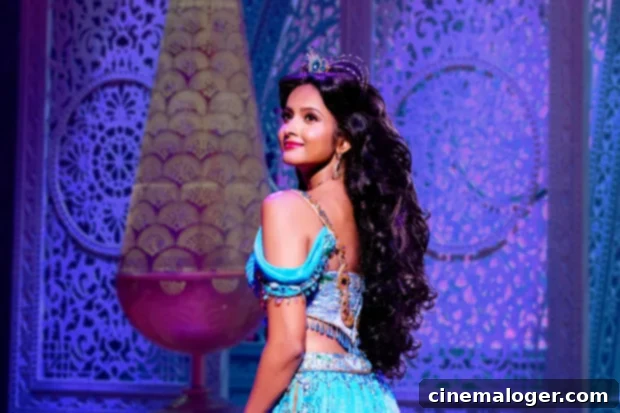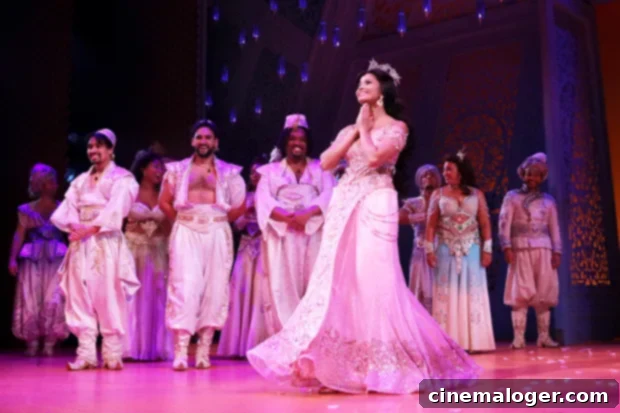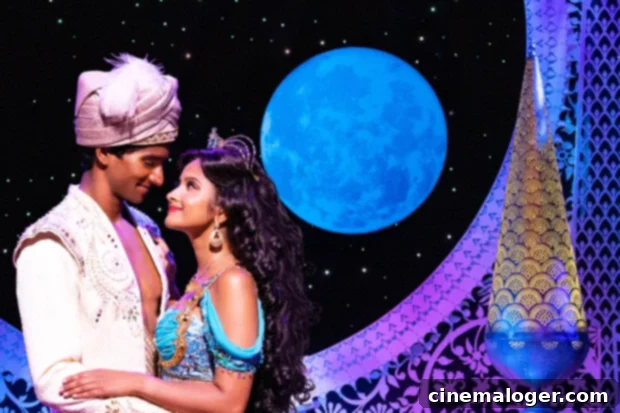Shoba Narayan’s Jasmine: Ushering in a New Era of Cultural Authenticity and Representation on Broadway
The global pandemic brought the world to an unprecedented halt, offering a crucial period for introspection and profound societal transformation. In the spring of 2020, the tragic murder of George Floyd served as a catalyst, igniting a powerful and unified demand for progress and systemic change. This movement reverberated across every industry, from the glittering studios of Hollywood to the financial heart of Wall Street, and significantly, to the revered stages of Broadway. The collective outcry for greater inclusion, equity, and diversity began to reshape the performing arts community in fundamental ways. As the iconic marquee lights of New York City’s theater district illuminate once more, a palpable and welcome change is evident: playwrights, lyricists, choreographers, actors, and countless other theater professionals of color are increasingly finding deserved opportunities and recognition within the industry. Among these trailblazers is Shoba Narayan, who, after the challenging hiatus, has embraced a pivotal role as the beloved Disney princess, Jasmine, in Disney’s enchanting musical, Aladdin. In stepping into the regal shoes of Agrabah’s princess, Narayan is not merely performing a role; she is imbuing it with her rich South Asian heritage, bringing an unprecedented layer of diversity and cultural authenticity to a character cherished by millions worldwide and redefining what it means to be a modern Disney princess on Broadway.

Embodying Jasmine: A Modern Princess with Inner Strength and Compassion
Shoba Narayan’s interpretation of Jasmine goes far beyond the traditional princess archetype; she describes the character with compelling agency, proclaiming her “a boss.” Recounting her thoughts on her first Broadway role post-pandemic, Narayan articulated her vision for the character’s essence: “She goes after what she wants and leads with her heart. What I hope to bring to this portrayal of Jasmine is that inner strength, that will to speak her mind, and the curiosity and compassion for the world around her.” This perspective aligns perfectly with the evolving understanding of Disney princesses, moving past passive damsels in distress to powerful, independent women who actively shape their own destinies and contribute to their communities. Narayan’s commitment to portraying Jasmine’s profound inner strength and unwavering spirit ensures that the character resonates deeply with contemporary audiences, particularly young women who seek role models of resilience, integrity, and self-determination.
Her nuanced approach emphasizes Jasmine’s intellectual curiosity, her desire to understand the world beyond the palace walls, and her profound empathy for her people. This portrayal creates a leader who is both formidable in her convictions and deeply humane in her interactions. Narayan’s Jasmine is not just a romantic lead; she is a crucial figure of governance and social justice within Agrabah, challenging established norms and advocating for a better future. By highlighting these facets, Shoba Narayan ensures that her Jasmine is a vibrant, multifaceted character who reflects modern values while remaining true to the adventurous spirit of the original story. Her performance makes the princess of Agrabah an inspiring figure, capable of inspiring audiences to embrace their own voices and stand up for what they believe is right.
A Legacy of Representation: Connecting with South Asian and Middle Eastern Audiences
For generations of individuals from South Asian and Middle Eastern backgrounds, authentic and positive representation in mainstream Western media has been historically scarce. This profound cultural void made Disney’s animated Aladdin film, first released in 1992, a seminal cultural touchstone for many. “We, South Asians and Middle Eastern people, didn’t have a lot to look to in the media growing up, so the Aladdin movie meant a lot to us and gave us some pride,” Shoba Narayan shared in an exclusive interview with HollywoodLife. The film, despite its imperfections in cultural representation, offered a rare glimpse of a world that resonated with elements of their own heritage, fostering a nascent sense of belonging and cultural pride in a way few other mainstream productions did.
Narayan’s casting in the Broadway production amplifies this connection exponentially. Her personal connection to the role is deeply felt and expressed: “I bring myself and my experiences to every role that I do, but this one in particular is really the closest that I’ve played to where I’m from.” This profound statement underscores how her genuine lived experience as a South Asian woman enriches her performance, infusing Jasmine with an authenticity that transcends typical acting. Audiences now witness a Jasmine whose portrayal is informed by a truly personal understanding of the cultural context, making the character not just relatable, but genuinely representative. This is a powerful step forward in ensuring that beloved stories reflect the rich and diverse tapestry of their global fan base, allowing countless individuals to see themselves authentically reflected on a major theatrical stage.
Beyond her acting prowess, Shoba Narayan is also an accomplished Bharatanatyam dancer and teacher. Bharatanatyam is a major form of Indian classical dance that originated in the Hindu temples of Tamil Nadu, South India. Known for its intricate footwork, elaborate hand gestures (mudras), and expressive facial movements, it is a demanding art form that requires years of rigorous training, immense discipline, and a deep cultural and spiritual understanding. Narayan’s mastery of this ancient art has become an invaluable asset to the Aladdin production. It not only informs her own nuanced portrayal of Jasmine’s grace and poise but also significantly enriches the entire cast’s understanding and execution of the show’s vibrant choreography. Her background provides a unique and authentic bridge between traditional South Asian artistic expressions and the dynamic demands of a contemporary Broadway musical, ensuring that the visual storytelling is as culturally resonant and respectful as the narrative itself.

Elevating Choreography Through Cultural Expertise and Collaboration
Narayan’s deep, lifelong knowledge of Bharatanatyam has proven to be a truly transformative element for Aladdin‘s theatrical presentation, elevating its authenticity and visual splendor. She vividly recounted an experience during choreography rehearsals: “When I was learning choreography for the show the other day, I think they were very surprised that I knew and was able to do the hand gestures, and the specificity in the movement. Casting someone who actually has that background, and the knowledge of those art forms is important.” This observation highlights a crucial point in modern casting: authentic representation extends far beyond superficial visual likeness; it encompasses a performer’s ability to imbue a role with genuine cultural understanding, physical language, and an intrinsic connection to the story’s roots. Her innate familiarity with specific mudras (symbolic hand gestures) and the subtle, expressive nuances of South Indian classical dance forms allowed her to execute movements with a precision, grace, and depth that might otherwise be absent in a performer without such a specialized background.
With the enthusiastic blessing and encouragement of the creative team, Narayan has gracefully stepped beyond her role as a performer, effectively serving as an informal cultural consultant for the production. “I’ve been able to teach my cast how to authentically move in this way, which, having someone come in to help give a more authentic take on that movement is going to enhance the show,” she explained. This collaborative and inclusive approach ensures that the vibrant dance sequences in Aladdin are not merely aesthetically pleasing, but also culturally informed, respectful, and deeply resonant. By guiding her fellow cast members in adopting authentic movements and gestures, Shoba Narayan is significantly elevating the overall artistic integrity and immersive quality of the production. This kind of genuine cultural exchange enriches the stage experience, offering audiences a more truthful, captivating, and respectful theatrical journey. It underscores the invaluable benefit of bringing diverse perspectives and specialized cultural knowledge into creative processes, moving beyond superficial interpretations to truly embedded cultural truths. This commitment to authenticity ensures that the enchanting world of Agrabah is portrayed with a heightened sense of realism and profound respect for the diverse cultures that inspired the timeless tale.

A Timely Message: The Future of Broadway Diversity and Representation
Narayan deeply cherishes the profound opportunity to share her cultural background and heritage with a broader American and global audience. “To be able share this side of myself with an American community is really special to me,” she continued, emphasizing the personal and professional significance of her groundbreaking role. She firmly believes in the enduring power and timeliness of the message her portrayal conveys, especially in the current cultural climate: “It’s powerful, timely, and very, very important to continue to spread that message as we continue on.” Her involvement with Aladdin transcends a single, outstanding performance; it represents a significant and inspiring step forward in Broadway’s ongoing journey toward genuine inclusivity, authentic representation, and equitable opportunities for artists from all backgrounds. The ripple effect of such prominent and culturally informed casting decisions is substantial, inspiring countless aspiring performers from underrepresented backgrounds and encouraging the development and embrace of more diverse narratives on stage.
The reopening of Broadway post-pandemic signifies not just a triumphant return to live theater, but also a crucial reimagining of its future. With artists like Shoba Narayan leading the way, the industry is demonstrating a clear and unwavering commitment to fostering a more equitable, diverse, and representative theatrical landscape. This transformative shift promises a Broadway that is richer in its narratives, more vibrant in its performances, and truly reflective of the diverse world it seeks to entertain, challenge, and inspire. As audiences flock to see Aladdin, they are not only treated to a dazzling spectacle of music, dance, and storytelling, but also to a performance that champions cultural authenticity and celebrates the profound impact of diverse voices on stage. Shoba Narayan’s Jasmine is more than just a beloved character brought to life; she is a powerful beacon of progress, a testament to the transformative power of authentic representation, and a vibrant example of Broadway’s evolving commitment to telling stories that resonate deeply and inclusively with everyone. Aladdin is now open on Broadway, inviting everyone to experience this enhanced and culturally enriched production, and to witness a new era of theatrical excellence.
